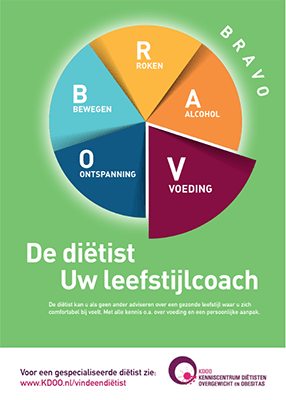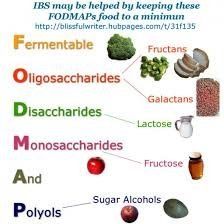Intestinal complaints
Bowel complaints have various causes. This can be related to diet, but also to lifestyle factors. A dietitian is a specialist in this to help you.
For which complaints can you go?
- constipation
- diarrhea
- flatulence, gas formation
- food allergy
- food intolerance
- Crohn's disease,
- celiac disease
- irritable bowel

Irritable bowel syndrome
Have you been diagnosed with Irritable Bowel Syndrome?
It is important that you know this first before experimenting with nutrition. Exclusion of intestinal disease or inflammation is very important. Always consult your doctor first.
Guidance from a specialized dietitian is important. She can help you put together the right diet and see if the Fodmap diet is suitable to do. She also gives all kinds of useful tips and advice to keep it up. Then she supervises the structure of the diet. It is not wise to do this diet for longer than 6 weeks. Together we look at where the complaints come from, how products can be replaced properly and discover what is not well tolerated. This practice has been specially trained for this with several post-HBO courses.
Irritable Bowel Syndrome (also called IBS) is a common condition. The symptoms and stool pattern differ per person.
Complaints can be:
- constipation or diarrhea or a combination of these,
- bloated belly,
- pain, cramp
- rumbling stomach, lots of gas,
- flatulence
- varying complaints.
The causes are diverse. It is important that the general practitioner or internist / gastroenterologist has established the diagnosis. After all, a medical cause, such as Crohn's disease, celiac disease, etc. must be ruled out.
What to do?
Depending on the cause and complaints, a tailor-made advice is compiled. For one, more dietary fiber and moisture is sufficient, for the other completely different advice. Sometimes it is sufficient to omit gas-forming foods or sharp spices.
Lifestyle advice can also help, is there a lot of stress? Are you sleeping well? Do you work irregularly and are you having trouble with your diet? Are you moving enough?
But what is good to eat or not to eat? Can some foods be left out? Is the food not deficient?
After diagnosis and referral, we will look together with you at what can offer a good solution to reduce or eliminate the complaints and to put together a good, full-fledged diet. Always tailor-made advice. Lifestyle is also discussed, stress, sleeping problems, etc, everything that could possibly have an influence. We then look together at possibilities and solutions.
FODMAP diet
One of the possibilities is the FODMAP diet. This diet makes it clear whether certain types of carbohydrates are not digested properly, causing complaints. By omitting these types of carbohydrates and reintroducing them step by step, it becomes clear where the problems are.
SIBO diet
The SIBO diet is somewhat similar to the FODMAP diet, but goes a big step further. This diet is used when there is bacterial overgrowth in the intestines. By applying this diet, often in combination with anti-biotics, the intestines can relax and recover. After that, the food is rebuilt and usually everything can be eaten again. Why a bacterial overgrowth has developed can have several reasons. It is important that a gastroenterologist makes a diagnosis.
It is not recommended to try both of the above diets on your own, without a proper diagnosis and without professional guidance from a specialized dietitian!
This practice is specialized and collaborates with general practitioners, internists and gastroenterologists and hypnotherapists.
Besides the diet, there are more causes of an irritable bowel. It is often complex and difficult to pinpoint 1 cause.
The practice has therefore entered into a partnership with a practice for hypnotherapy and counseling: Practice Keerpunt in Alphen aan den Rijn. The therapist Alexandra van Eenennaam specializes in treatment for IBS. Hypnotherapy for IBS has been scientifically proven to be effective. Alexandra van Eenennaam is professional, experienced, well-trained and meets all quality criteria.
Read all about her practice and PDS on her website: https://www.keerpunt.today/prikkelbare-darm-syndrome

Fodmaps, what are they?
Oligosacchariden
For example fructans: wheat, barley, rye, legumes, Brussels sprouts, radish,
Disacchariden
lactose: milk, yogurt, cottage cheese, cream
Monosacchariden
Fructose: for example mango, apple, pear, sugar snaps
Polyolen
sorbitol and mannitol: for example: cauliflower, avocado, fennel, sweet potato, sauerkraut





